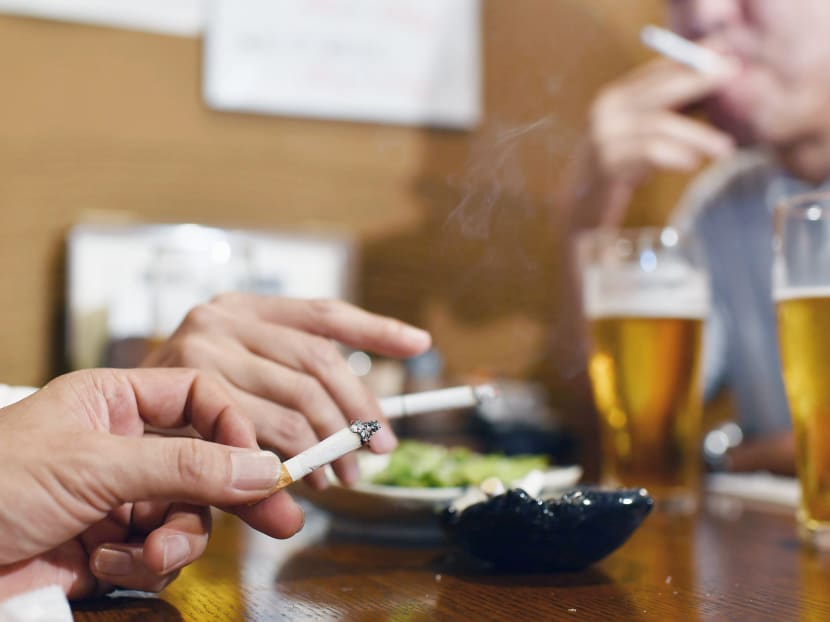Bill to address passive smoking in Japan in limbo
TOKYO — Planned legislation to address passive smoking by banning lighting up in restaurants is in limbo following strife between the health ministry and the ruling party.

People smoking in a restaurant in Tokyo, Japan. Planned legislation to address passive smoking by banning lighting up in restaurants is in limbo following strife between Japan’s health ministry and the ruling party. Photo: Kyodo News
TOKYO — Planned legislation to address passive smoking by banning lighting up in restaurants is in limbo following strife between the health ministry and the ruling party.
After a failed attempt to submit a bill to parliament during the latest session, Japan’s Health, Labour and Welfare Ministry hopes to bring one before an extra session likely to convene in fall.
But despite health experts pointing out that Japan lags behind many other countries in measures against passive smoking, prospects for a compromise are dim.
“We were unable to hold sufficient scientific evidence-based discussions,” Health Minister Yasuhisa Shiozaki, a lawmaker from the ruling Liberal Democratic Party and a key proponent of tackling passive smoking, said shortly after the 150-day Diet session ended in mid-June.
He read out a three-page statement explaining how Japan falls short in the area and what new measures are needed, showing data on health damage caused by passive smoking and global anti-smoking trends.
The health ministry in October 2016 proposed imposing an indoor smoking ban for restaurants in principle, albeit allowing them to set up smoking sections.
Many members of the ruling Liberal Democratic Party (LDP) opposed the idea.
During a meeting of the party’s health policy board in February, one member said, “I have been smoking for more than 50 years but I’m healthy,” and another said, “Car exhaust is more harmful.”
The ministry made a concession and in a new proposal in March suggested exempting small bars with a floor area of up to 30 sq m from an indoor smoking ban.
The LDP demanded the exemption be expanded to restaurants and bars of up to 150 sq m on condition that they put up a sign showing smoking is allowed or if they have a separate smoking area.
The LDP proposal means most restaurants and bars in Japan would remain smoking.
Mr Shiozaki offered introducing a grace period for anti-smoking measures and held talks with LDP policy board chairman Toshimitsu Motegi.
But they failed to iron out differences, and the ministry was unable to formulate a bill to revise the health promotion law that currently leaves anti-passive smoking measures up to bar and restaurant operators’ “efforts.”
Health problems attributed to passive smoking are widely known. According to the National Cancer Centre, people exposed to passive smoking have a 1.3-fold greater chance of developing lung cancer or strokes than those free from secondhand smoke.
An estimated 15,000 people die annually in Japan due to the impact of passive smoking, roughly four times more than the number of annual traffic accident deaths in the country.
Research estimated that additional medical expenses resulting from the effects of second-hand smoke amount to more than 300 billion yen (S$3.68 billion) per year in Japan.
LDP lawmakers opposing the ministry’s plan to amend the law stress the need to protect the right to smoke and the livelihoods of tobacco growers, as well to avoid a reduction in tobacco tax revenue, currently worth about two trillion yen annually.
They also point to possible revenue falls for restaurants and bars.
An Aichi prefectural government survey on local restaurants that have gone non-smoking, however, found revenue dropped at only 4 per cent of restaurants and was unchanged at 95 per cent.
The Royal Host family restaurant chain introduced a total smoking ban in 2013 for the health of customers and workers.
Revenue initially contracted at some of its restaurants, but firmed back roughly three months after becoming non-smoking, an official of the operator said.
Some customers come to its restaurants due to the fact that smoking is prohibited, according to the official.
The health ministry showed the data to LDP lawmakers but they “didn’t give a fig for them”, a senior ministry official said.
The Japan Society for Tobacco Control and their supporters have begun collecting signatures to urge Prime Minister Shinzo Abe to retain Mr Shiozaki as health minister when he reshuffles his Cabinet, possibly in early August.
Without Mr Shiozaki in the reshuffled Cabinet, “the party will take over the initiative and water down measures” to counter passive smoking, an LDP lawmaker said.
Opposing the legislation despite the health problems of passive smoking “is not a failure to act but an act of murder,” said Dr Hiroshi Yamato, a professor at the University of Occupational and Environmental Health who is well-versed in the problem of second-hand smoking.
Measures against passive smoking will “get nowhere if they are left to people’s own initiative as in the case of seatbelts,” Dr Yamato said. “To protect life, it is absolutely necessary for the state to make the adoption of them legally mandatory.” KYODO NEWS






